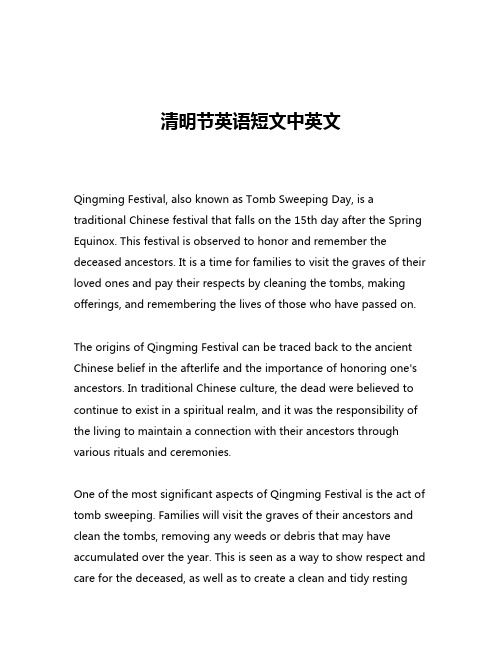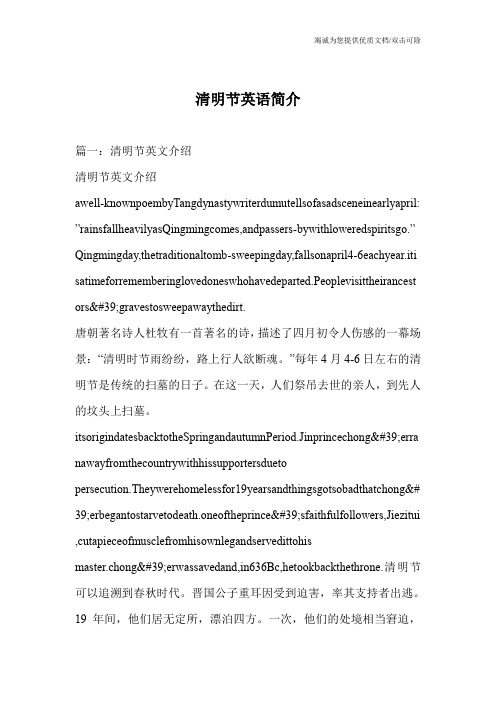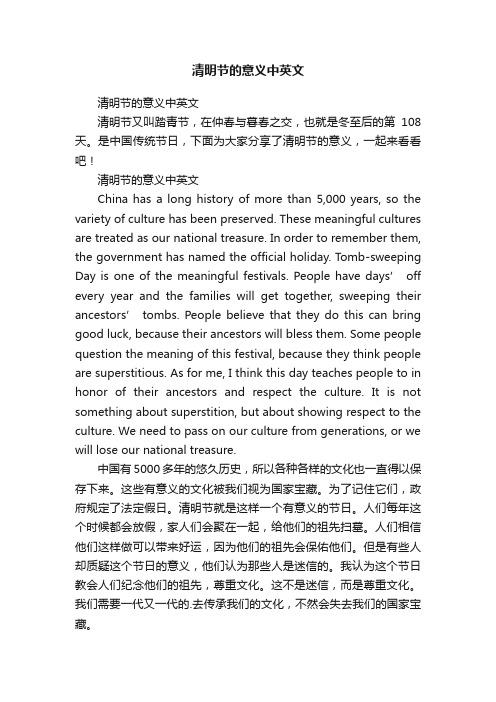清明节(中英文)讲解
清明中英双语介绍

清明中英双语介绍Qingming Festival is an ancient festival of the Chinese nation. It is not only a solemn festival of sweeping tombs and offering sacrifices to ancestors, but also a happy festival for people to get close to nature, go outing and enjoy the fun of spring.清明节是中华民族古老的节日,既是一个扫墓祭祖的肃穆节日,也是人们亲近自然、踏青游玩、享受春天乐趣的欢乐节日。
Qingming solar term time in the Gregorian calendar before and after April 5. In this season, the vitality is exuberant, the Yin Qi is declining, and all things "give up the old and accept the new". The Earth presents the image of spring and scenery. It is a good time for suburban youth travel and Qing Dynasty tomb sacrifice.清明节气时间在公历4月5日前后。
这一时节,生气旺盛、阴气衰退,万物“吐故纳新”,大地呈现春和景明之象,正是郊外踏青春游与行清墓祭的好时节。
The Qingming ancestor worship Festival lasts for a long time. There are two kinds of sayings: 10 days before and 8 days after and 10 days before and 10 days after. These nearly 20 days belong to the Qingming ancestor worship Festival.清明祭祖节期很长,有10日前8日后及10日前10日后两种说法,这近20天内均属清明祭祖节期内。
清明节英语短文中英文

清明节英语短文中英文Qingming Festival, also known as Tomb Sweeping Day, is a traditional Chinese festival that falls on the 15th day after the Spring Equinox. This festival is observed to honor and remember the deceased ancestors. It is a time for families to visit the graves of their loved ones and pay their respects by cleaning the tombs, making offerings, and remembering the lives of those who have passed on.The origins of Qingming Festival can be traced back to the ancient Chinese belief in the afterlife and the importance of honoring one's ancestors. In traditional Chinese culture, the dead were believed to continue to exist in a spiritual realm, and it was the responsibility of the living to maintain a connection with their ancestors through various rituals and ceremonies.One of the most significant aspects of Qingming Festival is the act of tomb sweeping. Families will visit the graves of their ancestors and clean the tombs, removing any weeds or debris that may have accumulated over the year. This is seen as a way to show respect and care for the deceased, as well as to create a clean and tidy restingplace for their spirits.In addition to tomb sweeping, many families will also make offerings to their ancestors during Qingming Festival. These offerings can take the form of food, incense, paper money, or other symbolic items that are believed to be useful in the afterlife. The act of making these offerings is seen as a way to honor the memory of the deceased and to provide them with the necessary provisions for their journey in the spiritual realm.Another important tradition associated with Qingming Festival is the flying of kites. It is believed that the act of flying kites during this festival can help to connect the living with the spirits of the deceased. The kites are often decorated with images of the deceased or with messages and prayers for their well-being in the afterlife.In recent years, Qingming Festival has also become an opportunity for families to come together and enjoy the natural beauty of the spring season. Many people will visit parks or gardens during this time, taking in the sights and sounds of the blooming flowers and trees. This is seen as a way to honor the cycle of life and to appreciate the natural world that surrounds us.Despite the solemn nature of Qingming Festival, it is also a time of celebration and community. Many towns and cities will host variousevents and activities to mark the occasion, such as traditional Chinese music performances, cultural exhibitions, and community gatherings.One of the most significant changes in the way that Qingming Festival is celebrated in recent years is the increasing use of technology. Many people now use mobile apps and online platforms to connect with their ancestors and to share memories and photos of their loved ones. This has made it easier for families to stay connected and to honor their ancestors even when they are physically separated.Overall, Qingming Festival is a deeply meaningful and important tradition in Chinese culture. It is a time for families to come together, to honor their ancestors, and to reflect on the cycle of life and death. Whether through the act of tomb sweeping, making offerings, or simply enjoying the natural beauty of the spring season, Qingming Festival remains an important part of the cultural fabric of China and a cherished tradition for many people around the world.。
双语介绍清明节英文ppt

★英语资源频道为⼤家整理的双语介绍清明节英⽂ppt。
清明的意思是清淡明智。
“清明”是夏历⼆⼗四节⽓之⼀,中国⼴⼤地区有在清明之⽇进⾏祭祖、扫墓、踏青的习俗,逐渐演变为华⼈以扫墓、祭拜等形式纪念祖先的⼀个中国传统节⽇。
更多阅读请查看本站频道。
The Qingming (Pure Brightness) Festival is one of the 24 seasonal division points in China, falling on April 4-6 each year. After the festival, the temperature will rise up and rainfall increases. It is the high time for spring plowing and sowing. But the Qingming Festival is not only a seasonal point to guide farm work, it is more a festival of commemoration. The Qingming Festival sees a combination of sadness and happiness. This is the most important day of sacrifice. Both the Han and minority ethnic groups at this time offer sacrifices to their ancestors and sweep the tombs of the diseased. Also, they will not cook on this day and only cold food is served. The Hanshi (Cold Food) Festival was usually one day before the Qingming Festival. As our ancestors often extended the day to the Qingming, they were later combined. On each Qingming Festival, all cemeteries are crowded with people who came to sweep tombs and offer sacrifices. Traffic on the way to the cemeteries becomes extremely jammed. The customs have been greatly simplified today. After slightly sweeping the tombs, people offer food, flowers and favorites of the dead, then burn incense and paper money and bow before the memorial tablet. In contrast to the sadness of the tomb sweepers, people also enjoy hope of Spring on this day. The Qingming Festival is a time when the sun shines brightly, the trees and grass become green and nature is again lively. Since ancient times, people have followed the custom of Spring outings. At this time tourists are everywhere. People love to fly kites during the Qingming Festival. Kite flying is actually not limited to the Qingming Festival. Its uniqueness lies in that people fly kites not during the day, but also at night. A string of little lanterns tied onto the kite or the thread look like shining stars, and therefore, are called "god's lanterns." The Qingming Festival is also a time to plant trees, for the survival rate of saplings is high and trees grow fast later. In the past, the Qingming Festival was called "Arbor Day". But since 1979, "Arbor Day" was settled as March 12 according to the Gregorian calendar. 清明节 清明是我国的⼆⼗四节⽓之⼀。
清明节英语简介

清明节英语简介篇一:清明节英文介绍清明节英文介绍awell-knownpoembyTangdynastywriterdumutellsofasadsceneinearlyapril:”rainsfallheavilyasQingmingcomes,andpassers-bywithloweredspiritsgo.”Qingmingday,thetraditionaltomb-sweepingday,fallsonapril4-6eachyear.iti satimeforrememberinglovedoneswhohavedeparted.Peoplevisittheirancest ors'gravestosweepawaythedirt.唐朝著名诗人杜牧有一首著名的诗,描述了四月初令人伤感的一幕场景:“清明时节雨纷纷,路上行人欲断魂。
”每年4月4-6日左右的清明节是传统的扫墓的日子。
在这一天,人们祭吊去世的亲人,到先人的坟头上扫墓。
itsorigindatesbacktotheSpringandautumnPeriod.Jinprincechong'erra nawayfromthecountrywithhissupportersduetopersecution.Theywerehomelessfor19yearsandthingsgotsobadthatchong&# 39;erbegantostarvetodeath.oneoftheprince'sfaithfulfollowers,Jiezitui ,cutapieceofmusclefromhisownlegandservedittohismaster.chong'erwassavedand,in636Bc,hetookbackthethrone.清明节可以追溯到春秋时代。
清明节介绍课件(英文版)

Origin of the Qingming Festival
The "cold food" festival occurs on the eve of Qing Ming and is often considered as part of the Qing Ming festival. As time passes, the Qing Ming festival replaced the "cold food" festival. Whatever practice is observed,the basic observation of Qing Ming is to remember one's elders by making a special effort to visit their graves, ashes or ancestral tablets. To make the visit even more meaningful, some time should be spent to remind the younger members of the family of the lives and contributions of their ancestors, and the story of Jie Zi Zhui who choose death over capitulation.
清明节介绍3段式英语作文

清明节介绍3段式英语作文(中英文版)Section 1: IntroductionQingming Festival, also known as Tomb-Sweeping Day, is one of the most important traditional Chinese festivals, celebrated on the 15th day after the Spring Equinox, usually falling around April 4th or 5th.It is a time for people to honor their ancestors, show respect for the deceased, and enjoy the beauty of spring.Section 2: Significance and CustomsThe Qingming Festival holds great significance in Chinese culture as it combines both mourning and celebration.It is a day to remember and pay tribute to ancestors, relatives, and friends who have passed away.Families come together to visit graves, clean tombstones, and offer food, tea, and other tributes to the spirits of the departed.In addition to its solemn aspect, the festival also has a festive side.It is a time for people to appreciate the arrival of spring and engage in outdoor activities such as flying kites, taking nature walks, and enjoying the vibrant colors of the season.The clear skies and warm weather during the festival make it a popular time for family outings and picnics.Section 3: ConclusionThe Qingming Festival is a unique celebration that embodies the essence of Chinese culture, balancing mourning and celebration,remembrance and renewal.It is a day that honors the past while looking forward to the future, and a time to appreciate the beauty of life and the cycle of nature.With its rich history and deep cultural significance, the Qingming Festival continues to be celebrated by people all over China, reminding us of our roots and the importance of family and tradition.。
清明节的意义中英文

清明节的意义中英文清明节的意义中英文清明节又叫踏青节,在仲春与暮春之交,也就是冬至后的第108天。
是中国传统节日,下面为大家分享了清明节的意义,一起来看看吧!清明节的意义中英文China has a long history of more than 5,000 years, so the variety of culture has been preserved. These meaningful cultures are treated as our national treasure. In order to remember them, the government has named the official holiday. Tomb-sweeping Day is one of the meaningful festivals. People have days’ off every year and the families will get together, sweeping their ancestors’ tombs. People believe that they do this can bring good luck, because their ancestors will bless them. Some people question the meaning of this festival, because they think people are superstitious. As for me, I think this day teaches people to in honor of their ancestors and respect the culture. It is not something about superstition, but about showing respect to the culture. We need to pass on our culture from generations, or we will lose our national treasure.中国有5000多年的悠久历史,所以各种各样的文化也一直得以保存下来。
清明节的来历英文版(附中文对照翻译)

清明节的来历英文版(附中文对照翻译)导语:关于清明节的来历和习俗用英文怎么说?中英双语对照的清明来历介绍已经为你准备好了!以下是本站小编整理的清明节的来历英文版,欢迎阅读参考!清明节的来历英文版 Qingming is also called the festival folklore is in commemoration of spring autumn food Jie Zitui was burned to Mianshan, Duke Wen ordered the ban on fire. Muon push is the people of Shanxi, so cold in Shanxi first popular custom. The old cold food off the fire, the house is wood drilling take new fire ceremony, folk are mostly wicker begging each other for new fire.清明又称寒食节民间传说寒食是为了纪念春秋时的介子推被火焚于绵山,晋文公下令禁火。
介子推是山西人,所以冷食习俗在山西首先流行。
旧时寒食断火,次日宫中有钻木取新火的仪式,民间也多以柳条互相乞取新火。
清明节的来历英文版清明节的起源,据传始于古代帝王将相“墓祭”之礼,后来民间亦相仿效,于此日祭祖扫墓,历代沿袭而成为中华民族一种固定的风俗。
本来,寒食节与清明节是两个不同的节日,到了唐朝,将祭拜扫墓的日子定为寒食节。
寒食节的正确日子是在冬至后一百零五天,约在清明前后,因两者日子相近,所以便将清明与寒食合并为一日。
Ching Ming Festival, the origin of the ancient emperors began rumored "Muji," the ceremony, and later also with civil society to follow, here on ancestral grave, Gems followed to become a fixed custom of the Chinese nation. Originally, the Cold Food Festival and the festival are two different festivals, the Tang dynasty, will be the days of grave worship as Cold Food Festival. Cold Food Festival in the correct date is 105 days after the winter solstice, about the Ching Ming before and after two days due to close, and so the Ching Ming and the Cold Food into day.清明节的来历英文版The origin of the qingming festival清明节又叫踏青节,在仲春与暮春之交,也就是冬至后的第108天。
- 1、下载文档前请自行甄别文档内容的完整性,平台不提供额外的编辑、内容补充、找答案等附加服务。
- 2、"仅部分预览"的文档,不可在线预览部分如存在完整性等问题,可反馈申请退款(可完整预览的文档不适用该条件!)。
- 3、如文档侵犯您的权益,请联系客服反馈,我们会尽快为您处理(人工客服工作时间:9:00-18:30)。
刘邦高兴得不得了,马上请人重新整修父母亲的墓,而且从此以后, 每年的清明节一定到父母的坟上祭拜。后来民间的百姓,也和刘邦一 样每年的清明节都到祖先的坟墓祭拜,并且用小土块压几张纸片在坟 上,表示这座坟墓是有人祭扫的。
Another origin of the Chin来自 MingFestival
• 相传春秋战国时代,晋献公的妃子骊姬为了让自己的儿子奚齐继位,就设毒计谋害太 子申生,申生被逼自杀。申生的弟弟重耳,为了躲避祸害,流亡出走。流亡期间,重 耳受尽屈辱。跟着他一道出奔的臣子,大多陆陆续续地各奔出路去了。只剩下少数几 个忠心耿耿的人,一直追随着他。其中一人叫介子推。有一次,重耳饿晕了过去。介 子推为了救重耳,从自己腿上割下了一块肉,用火烤熟了就送给重耳吃。十九年后, 重耳回国做了君主,就是著名春秋五霸之一晋文公。
Qingming dumpling (清明粽)
Mustard(芥菜)
Graving(扫墓)
• 清明扫墓,谓之对祖先的“思时之 敬”。其习俗由来已久。明《帝京 景物略》载:“三月清明日,男女 扫墓,担提尊□,轿马后挂楮锭, 粲粲然满道也。拜者、酹者、哭者、 为墓除草添土者,焚楮锭次,以纸 钱置坟头。望中无纸钱,则孤坟矣。 哭罢,不归也,趋芳树,择园圃, 列坐尽醉。”其实,扫墓在秦以前 就有了,但不一定是在清明之际, 清明扫墓则是秦以后的事。到唐朝 才开始盛行。《清通礼》云:“岁, 寒食及霜降节,拜扫圹茔,届期素 服诣墓,具酒馔及芟剪草木之器, 周胝封树,剪除荆草,故称扫墓。” 并相传至今。
the Ching Ming Festival
lantern festival
Spring festival
Chingming festival
Dragon Boat Festival
Tanabata Star Festival
Mid-Autumn Festival
Chung Yeung Festival
Ching Ming Lo(清明螺)
清明时节,正是采食螺 蛳的最佳时令,因这个 时节螺蛳还未繁殖,最 为丰满、肥美,故有 “清明螺,抵只鹅”之 说。螺蛳食法颇多,可 与葱、姜、酱油、料酒、 白糖同炒;也可煮熟挑 出螺肉,可拌、可醉、 可糟、可炝,无不适宜。 若食法得当,真可称得 上“一味螺蛳千般趣, 美味佳酿均不及”了
The origin of the Ching Ming
Festival
• 有关清明节的由来:相传在秦朝末年,汉高祖刘邦和西楚霸王项羽, 大战好几回合后,终于取得天下。他光荣返回故乡的时候,想要到父 母亲的坟墓上去祭拜,却因为连年的战争,使得一座座的坟墓上长满 杂草,墓碑东倒西歪,有的断落,有的破裂,而无法辨认碑上的文字。 刘邦非常的难过,虽然部下也帮他翻遍所有的墓碑,可是直到黄昏 的时候还是没找到他父母的坟墓。最後刘邦从衣袖里拿出一张纸,用 手撕成许多小碎片,紧紧捏在手上,然後向上苍祷告说:“爹娘在天 有灵,现在风刮得这么大,我将把这些小纸片,抛向空中,如果纸片 落在一个地方,风都吹不动,就是爹娘的坟墓。”说完刘邦把纸片向 空中抛,果然有一片纸片落在一座坟墓上,不论风怎么吹都吹不动, 刘邦跑过去仔细瞧一瞧模糊的墓碑,果然看到他父母的名字刻在上面。
• Green ball(青团子)
馓子
During thr Qingming Festival, people have Micro-sub in over north and south in China. "Micro-sub" is a deep-fried food, which is crisp beautiful. In ancient times, it is also called "a cold." Cold Food Festival is no longer popular in the most parts of our country, but the sub-micro is loved by the people. The raw material of Micro-sub is different between the North and the South. In North, it is made by wheat-based noodle, but in South it is made by rice-based(我国 南北各地清明节有吃馓子的食俗。“馓子” 为一油炸食品,香脆精美,古时叫“寒具”。 寒食节禁火寒食的风俗在我国大部分地区已 不流行,但与这个节日有关的馓子却深受世 人的喜爱。现在流行于汉族地区的馓子有南 北方的差异:北方馓子大方洒脱,以麦面为 主料;南方馓子精巧细致,多以米面为主料。 在少数民族地区,馓子的品种繁多,风味各 异,尤以维吾尔族、东乡族和纳西族以及宁 夏回族的馓子最为有名.)
割肉奉君尽丹心,但愿主公常清明。柳下作鬼终不见,强似伴君作谏臣。 倘若主公心有我,忆我之时常自省。 臣在九泉心无愧,勤政清明复清明。
晋文公将血书藏入袖中。然后把介子推和他的母亲分别安葬在那棵烧焦的大柳树下。 为了纪念介子推,晋文公下令把绵山改为“介山”,在山上建立祠堂,并把放火烧山 的这一天定为寒食节,晓谕全国,每年这天禁忌烟火,只吃寒食。
talking
• The origin of the Ching Ming Festival • What do you eat during the Ching Ming Festival • How do you celebrate the Ching Ming Festival in
your home? • Please translating a poetry
